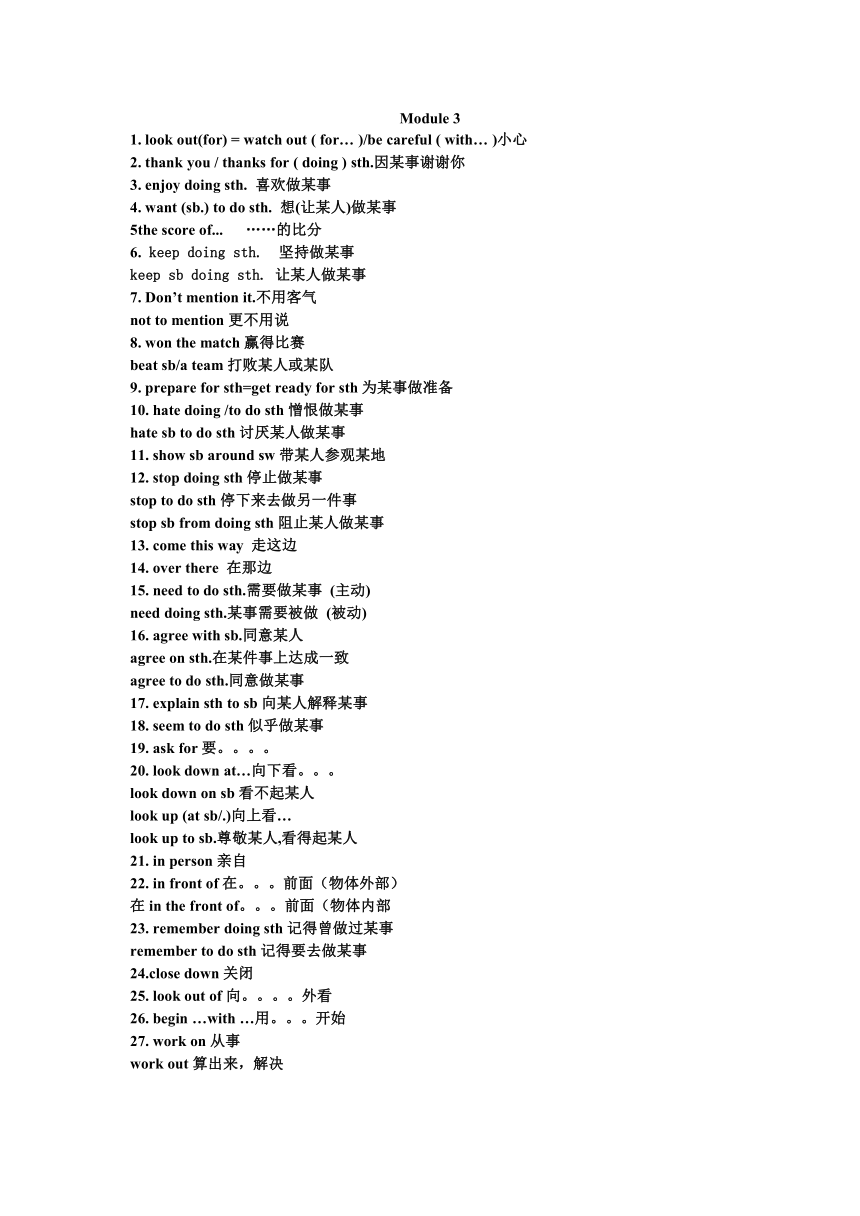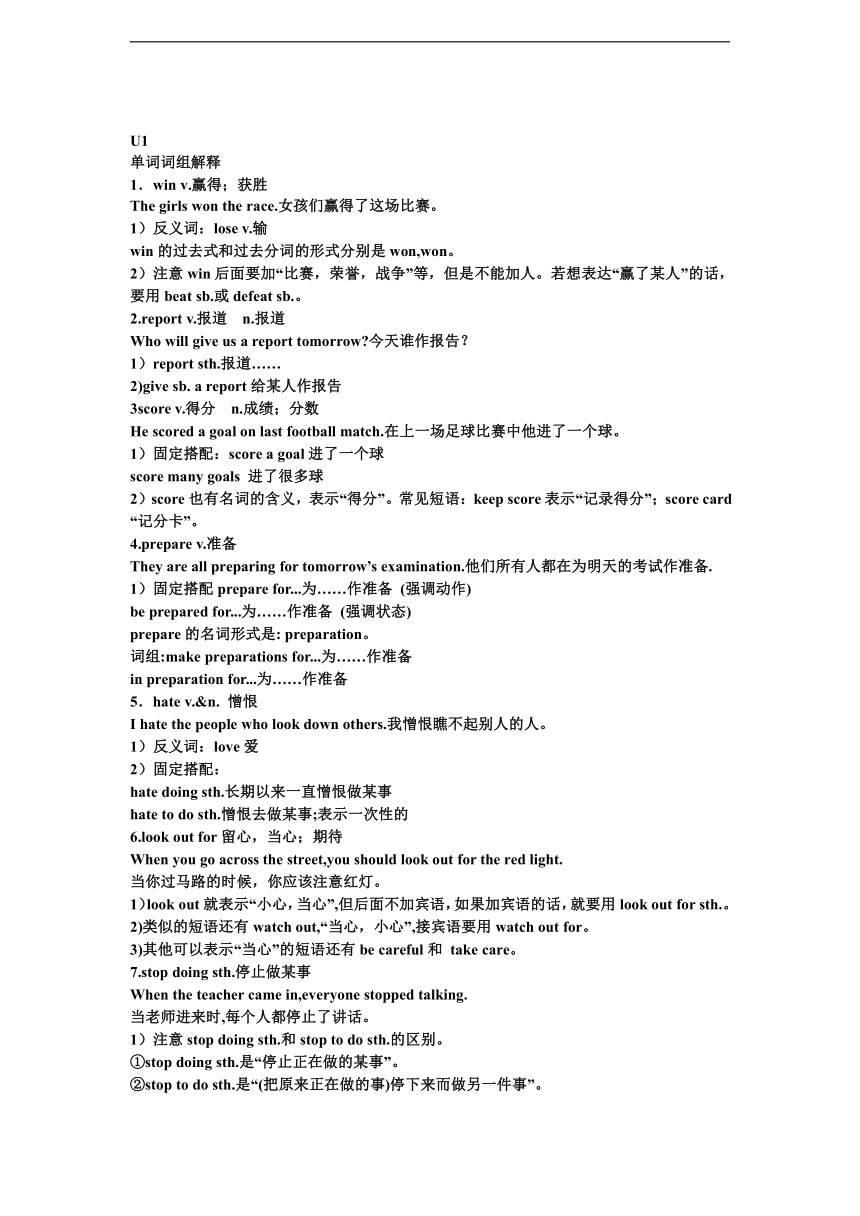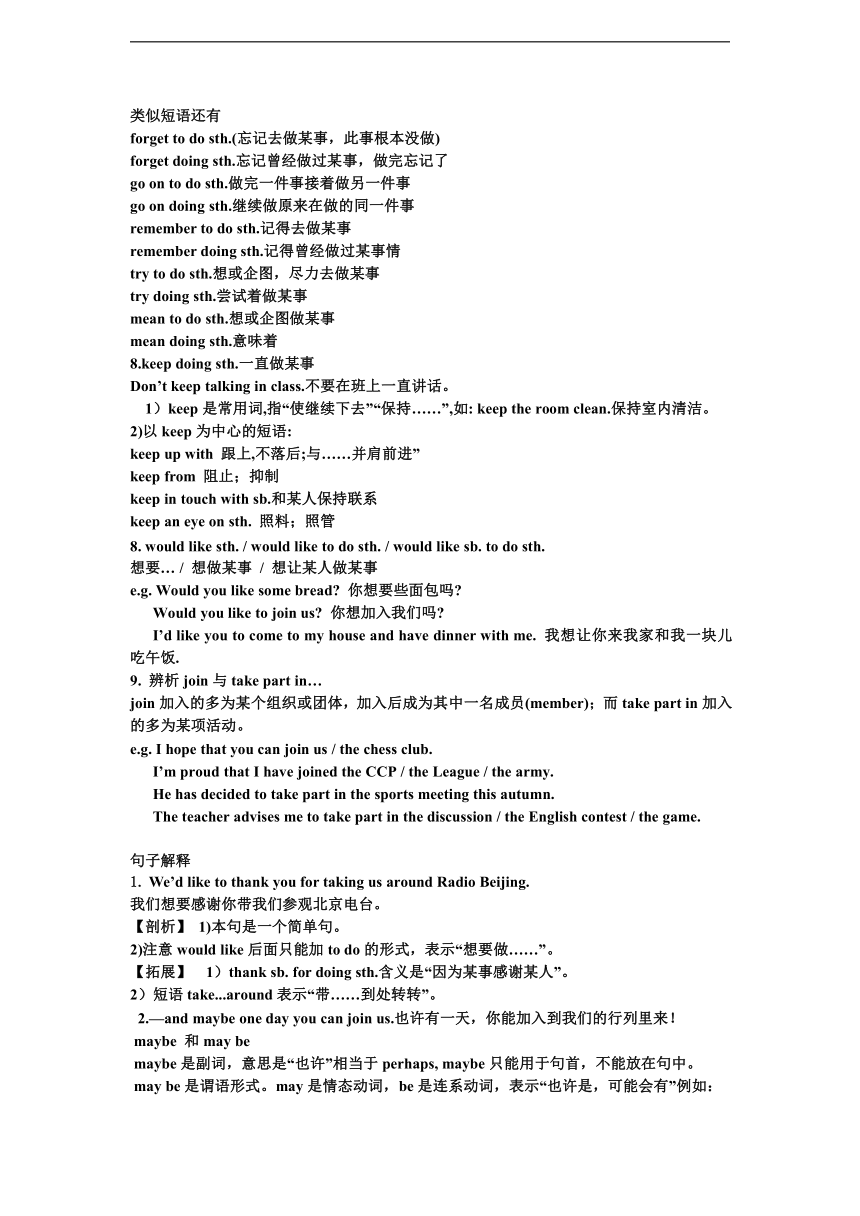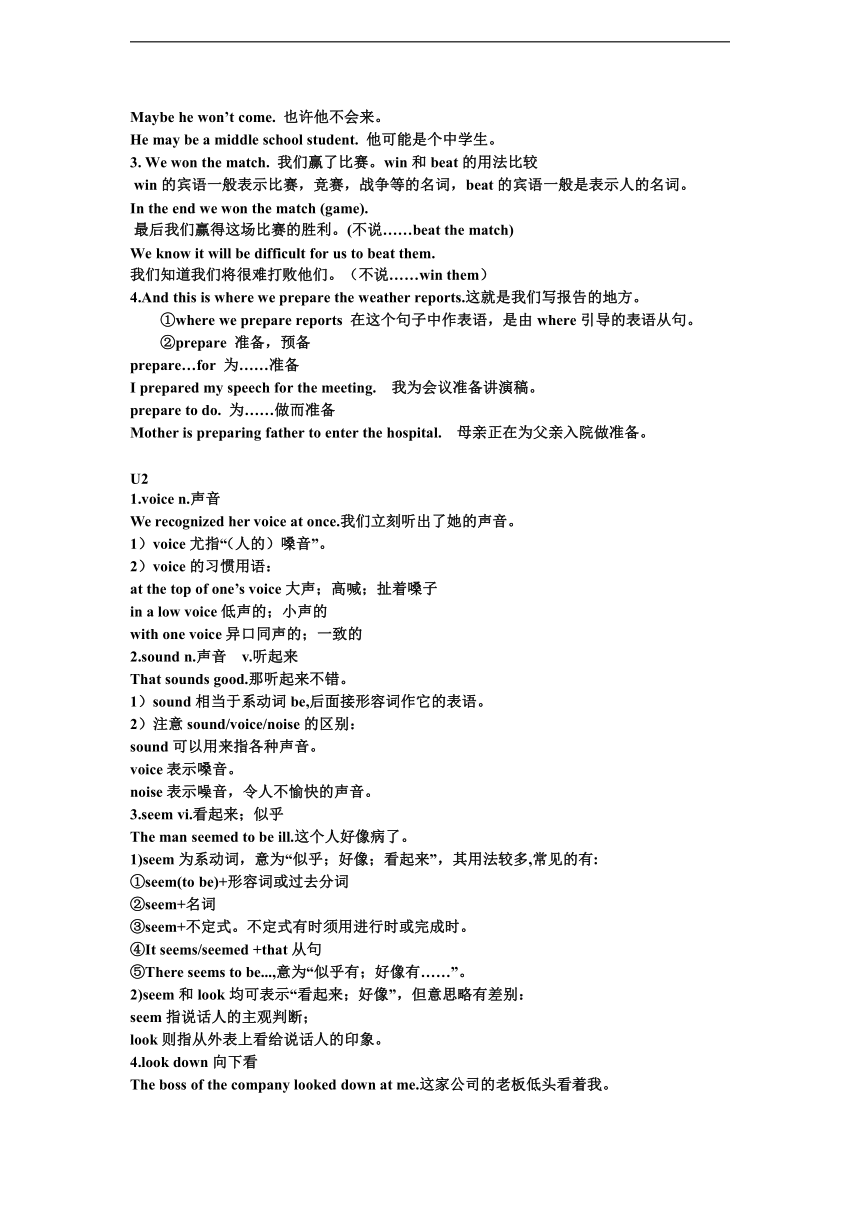Module 3 On the radio 知识点与同步练习(含答案)
文档属性
| 名称 | Module 3 On the radio 知识点与同步练习(含答案) |  | |
| 格式 | zip | ||
| 文件大小 | 34.4KB | ||
| 资源类型 | 教案 | ||
| 版本资源 | 外研版 | ||
| 科目 | 英语 | ||
| 更新时间 | 2012-04-08 15:53:47 | ||
图片预览




文档简介
Module 3
1. look out(for) = watch out ( for… )/be careful ( with… )小心
2. thank you / thanks for ( doing ) sth.因某事谢谢你
3. enjoy doing sth. 喜欢做某事
4. want (sb.) to do sth. 想(让某人)做某事
5the score of... ……的比分
6. keep doing sth. 坚持做某事
keep sb doing sth. 让某人做某事
7. Don’t mention it.不用客气
not to mention更不用说
8. won the match赢得比赛
beat sb/a team打败某人或某队
9. prepare for sth=get ready for sth为某事做准备
10. hate doing /to do sth憎恨做某事
hate sb to do sth讨厌某人做某事
11. show sb around sw带某人参观某地
12. stop doing sth停止做某事
stop to do sth停下来去做另一件事
stop sb from doing sth阻止某人做某事
e this way 走这边
14. over there 在那边
15. need to do sth.需要做某事 (主动)
need doing sth.某事需要被做 (被动)
16. agree with sb.同意某人
agree on sth.在某件事上达成一致
agree to do sth.同意做某事
17. explain sth to sb向某人解释某事
18. seem to do sth似乎做某事
19. ask for要。。。。
20. look down at…向下看。。。
look down on sb看不起某人
look up (at sb/.)向上看…
look up to sb.尊敬某人,看得起某人
21. in person亲自
22. in front of在。。。前面(物体外部)
在in the front of。。。前面(物体内部
23. remember doing sth记得曾做过某事
remember to do sth记得要去做某事
24.close down关闭
25. look out of向。。。。外看
26. begin …with …用。。。开始
27. work on从事
work out算出来,解决
U1
单词词组解释
1.win v.赢得;获胜
The girls won the race.女孩们赢得了这场比赛。
1)反义词:lose v.输
win的过去式和过去分词的形式分别是won,won。
2)注意win后面要加“比赛,荣誉,战争”等,但是不能加人。若想表达“赢了某人”的话,要用beat sb.或defeat sb.。
2.report v.报道 n.报道
Who will give us a report tomorrow 今天谁作报告?
1)report sth.报道……
2)give sb. a report给某人作报告
3score v.得分 n.成绩;分数
He scored a goal on last football match.在上一场足球比赛中他进了一个球。
1)固定搭配:score a goal进了一个球
score many goals 进了很多球
2)score也有名词的含义,表示“得分”。常见短语:keep score表示“记录得分”;score card “记分卡”。
4.prepare v.准备
They are all preparing for tomorrow’s examination.他们所有人都在为明天的考试作准备.
1)固定搭配prepare for...为……作准备 (强调动作)
be prepared for...为……作准备 (强调状态)
prepare的名词形式是: preparation。
词组:make preparations for...为……作准备
in preparation for...为……作准备
5.hate v.&n. 憎恨
I hate the people who look down others.我憎恨瞧不起别人的人。
1)反义词:love爱
2)固定搭配:
hate doing sth.长期以来一直憎恨做某事
hate to do sth.憎恨去做某事;表示一次性的
6.look out for留心,当心;期待
When you go across the street,you should look out for the red light.
当你过马路的时候,你应该注意红灯。
1)look out就表示“小心,当心”,但后面不加宾语,如果加宾语的话,就要用look out for sth.。
2)类似的短语还有watch out,“当心,小心”,接宾语要用watch out for。
3)其他可以表示“当心”的短语还有be careful和 take care。
7.stop doing sth.停止做某事
When the teacher came in,everyone stopped talking.
当老师进来时,每个人都停止了讲话。
1)注意stop doing sth.和stop to do sth.的区别。
①stop doing sth.是“停止正在做的某事”。
②stop to do sth.是“(把原来正在做的事)停下来而做另一件事”。
类似短语还有
forget to do sth.(忘记去做某事,此事根本没做)
forget doing sth.忘记曾经做过某事,做完忘记了
go on to do sth.做完一件事接着做另一件事
go on doing sth.继续做原来在做的同一件事
remember to do sth.记得去做某事
remember doing sth.记得曾经做过某事情
try to do sth.想或企图,尽力去做某事
try doing sth.尝试着做某事
mean to do sth.想或企图做某事
mean doing sth.意味着
8.keep doing sth.一直做某事
Don’t keep talking in class.不要在班上一直讲话。
1)keep是常用词,指“使继续下去”“保持……”,如: keep the room clean.保持室内清洁。
2)以keep为中心的短语:
keep up with 跟上,不落后;与……并肩前进”
keep from 阻止;抑制
keep in touch with sb.和某人保持联系
keep an eye on sth. 照料;照管
8. would like sth. / would like to do sth. / would like sb. to do sth.
想要… / 想做某事 / 想让某人做某事
e.g. Would you like some bread 你想要些面包吗
Would you like to join us 你想加入我们吗
I’d like you to come to my house and have dinner with me. 我想让你来我家和我一块儿吃午饭.
9. 辨析join与take part in…
join加入的多为某个组织或团体,加入后成为其中一名成员(member);而take part in加入的多为某项活动。
e.g. I hope that you can join us / the chess club.
I’m proud that I have joined the CCP / the League / the army.
He has decided to take part in the sports meeting this autumn.
The teacher advises me to take part in the discussion / the English contest / the game.
句子解释
1. We’d like to thank you for taking us around Radio Beijing.
我们想要感谢你带我们参观北京电台。
【剖析】 1)本句是一个简单句。
2)注意would like后面只能加to do的形式,表示“想要做……”。
【拓展】 1)thank sb. for doing sth.含义是“因为某事感谢某人”。
2)短语take...around表示“带……到处转转”。
2.—and maybe one day you can join us.也许有一天,你能加入到我们的行列里来!
maybe 和may be
maybe是副词,意思是“也许”相当于perhaps, maybe只能用于句首,不能放在句中。
may be是谓语形式。may是情态动词,be是连系动词,表示“也许是,可能会有”例如:
Maybe he won’t come. 也许他不会来。
He may be a middle school student. 他可能是个中学生。
3. We won the match. 我们赢了比赛。win和beat的用法比较
win的宾语一般表示比赛,竞赛,战争等的名词,beat的宾语一般是表示人的名词。
In the end we won the match (game).
最后我们赢得这场比赛的胜利。(不说……beat the match)
We know it will be difficult for us to beat them.
我们知道我们将很难打败他们。(不说……win them)
4.And this is where we prepare the weather reports.这就是我们写报告的地方。
①where we prepare reports 在这个句子中作表语,是由where引导的表语从句。
②prepare 准备,预备
prepare…for 为……准备
I prepared my speech for the meeting. 我为会议准备讲演稿。
prepare to do. 为……做而准备
Mother is preparing father to enter the hospital. 母亲正在为父亲入院做准备。
U2
1.voice n.声音
We recognized her voice at once.我们立刻听出了她的声音。
1)voice尤指“(人的)嗓音”。
2)voice的习惯用语:
at the top of one’s voice大声;高喊;扯着嗓子
in a low voice低声的;小声的
with one voice异口同声的;一致的
2.sound n.声音 v.听起来
That sounds good.那听起来不错。
1)sound相当于系动词be,后面接形容词作它的表语。
2)注意sound/voice/noise的区别:
sound可以用来指各种声音。
voice表示嗓音。
noise表示噪音,令人不愉快的声音。
3.seem vi.看起来;似乎
The man seemed to be ill.这个人好像病了。
1)seem为系动词,意为“似乎;好像;看起来”,其用法较多,常见的有:
①seem(to be)+形容词或过去分词
②seem+名词
③seem+不定式。不定式有时须用进行时或完成时。
④It seems/seemed +that从句
⑤There seems to be...,意为“似乎有;好像有……”。
2)seem和look均可表示“看起来;好像”,但意思略有差别:
seem指说话人的主观判断;
look则指从外表上看给说话人的印象。
4.look down向下看
The boss of the company looked down at me.这家公司的老板低头看着我。
1)look down at sb.含义是“低头看某人”。
2)look down upon sb.含义是“看不起,轻视某人”。
3)look up (at sb/.)向上看…
4) look up to sb.尊敬某人,看得起某人
5.ask for要……
If you are in danger,remember to ask for help.如果你在危险之中,记得求助。
1)ask的习惯用语:
ask for trouble自找麻烦;自找苦吃
ask sb. sth.问某人某事
2) ask后面也可以加复合宾语,用不定式作宾语补足语。
句式为:ask sb. to do sth.“要求某人做某事”。
6.look out of从……向外看
Don’t look out of the window.不要向窗外看。
1)look out表示“小心,担心”,是用来提醒别人注意的。
look out for...表示“当心……”
look out of...表示“从……向外看”
look out over...表示“俯瞰……”
2)look的其他相关短语:
look up...查…… /向外看
look at...看……
句子解释
1. It seemed that they were speaking to me in person.感觉好像他们在面对面的说话。
seem表示“似乎”,后面可接不定式。
如不定式是to be加形容词,则to be有时可省去。例如:He seems (to be) quite happy. 他似乎很开心。
如用于否定句,可否定seem,也可否定不定式。如:
She didn’t seem to enjoy herself at the party.
=She seemed not to enjoy herself at the party.
她似乎在聚会上玩得不愉快。
2. I asked for jobs in small radio stations. 我去过小电台去寻求工作。
ask, ask for和ask…for的用法区别
1)ask直接接名(代)词作宾语,一般作“问”解,需要对方回答,还可接用两个宾语,如:
He has something to ask you. 他有件事要问你。
2)ask for则作“要求得(见)到”解。介词for引出要求希望得到的东西或见到的人,如:
May I ask for a photo of your family
我能要一张你们家人的照片吗?
3)表示“向某人要某物”则用ask sb. for…,如:
They asked her for some water.
他们向她要些水。
3.When I was about four or five years old,I remember sitting close to the radio in my living room,listening to my favourite programmes,and to the voices of my favorite presenters.
在我大约四或五岁的时候,我记得自己坐在客厅里的收音机旁,听我最喜欢的节目和我最喜欢的播音员的声音。
【剖析】 1)本句中when引导的是时间状语从句,listening to my favourite programmes,and to the voices of my favorite presenters在句中作状语,表示伴随状况。
2)my favourite programmes和the voice of my favorite presenters是listening to后面两个并列的宾语。and后面省略了listening。
【拓展】 1)and是个并列连词,用来连接两个并列的名词、动词、形容词或是短语,也可以用来连接两个并列的句子。
2)英语中的句子结构主要分为三种:简单句,并列句和复合句。
U3
to + v.与 v.-ing作宾语
跟动词不定式作宾语的动词有:
1. want to do sth.
2. would like to do sth.
3. hope to do sth. 希望自己做某事
4. wish to do sth.
5. plan to do sth.
6. need to do sth.
7. decide to do sth.
8. forget to do sth. 忘记做某事(尚未做)
9. remember to do sth. 记着去做某事(尚未
10. try to do sth.
11. agree to do sth. 同意做某事
必须跟v.-ing形式作宾语做宾语的情况:
1.enjoy doing sth. 喜欢做某事 例如: He enjoys watching TV.
2. finish doing sth. 完成做某事 例如:He finished cleaning the floor.
3. practise doing sth. 练习做某事 例如:He practises singing the song.
4. keep doing sth. 一直做某事 例如:He keeps writing the story.
5. give up doing sth. 放弃做某事 例如:He gave up smoking.
6. stop doing停止做某事 例如:He stopped watching TV.
既可以跟动词不定式又可以跟v.-ing形式做宾语的词, 有时候要注意它的意义的区别:
1. stop to do sth. 停下来去做某事
stop doing sth.停下来不做某事
2. see sb. do sth.看见某人做某事全过程
see doing sth.看见某人正在做某事
3. hear sb. do sth. 听见某人做某事全过程
hear doing sth.听见某人正在做某事
4. forget to do sth. 忘了去做某事
forget doing sth.做过某事而忘了
5. remember to do记得去做某事
remember doing sth.记得做过某事
选择题
1 ( ) Bob speaks English very well. He practise ________ English every day.
A speaking B speak C speaks D to speak
2 ( ) Tony enjoy _______ music from the Internat
A to listen B listens C listen D listening
3 ( ) Remember _______ off the light before you leave the classroom.
A turning B turns C to turn Dturn[来源:21世纪教育网]
4 ( ) It _______ that the worker didn’t eat anything.
A seems B seemed C seeming D seem
5 ( ) I want ______ go shopping with Betty and Lingling,but I don’ t have time.
A to go B going C go D went
6 ( ) The worker keep_______ in order to make money for their living
A working B to work C work D works
7 ( ) He would like ________ to go to the cinema with his brothers
A go B going C to go D gose
8 ( ) let’s go to the park on Sunday. That_______ like a great idea.
A sound B to sound C sounding D sounds
9 ( ) I like listening to the radio but I hate ______ TV.
A watching B to watch C watches D watched
10 ( ) She looks forward to ______ the Great Wall.
A see B seeing C to see D sees
11( ) — What can I do for you, sir
— I’m a book on the 2008 Olympic Games.
A. looking over B. looking for
C. looking after D. looking like
12( ) Please speak in a low . The baby is sleeping.
A. music B. sound C. voice D. noise
13( ) I remember my father play the violin at home very often when I was young. A. to listen to B. listening to C. to heard D. hearing
14( ) He likes not only skating in winter but also in summer.
A. swam B. swimming C. swims D. to swim
15 ( ) — What did the man say over there?
— He told us any further. There is danger ahead.
A. don’t go B. not go C. to go D. not to go
完成下列句子
1. 记得不要把这个秘密告诉他。
Remember ____ ____ ____him the secret.
2. 她很喜欢唱歌, 但今天因为不舒服,不想唱。
She likes singing, but she ______ _____ _____sing today because she isn’t comfortable.
3. 他停下来做功课。
He stops _____ _____ his homework.
4. 她希望不久能找到工作。
She hopes _____ _____ a job soon.
5. 这些花需要淋水。
The flowers _______ __________.
Keys:
1 a 2 d 3c 4 a 5 a 6 a 7c 8 d 9 a 10b B C B B D
not to tell /doesn’t like to/to do/to find/needs watering
1. look out(for) = watch out ( for… )/be careful ( with… )小心
2. thank you / thanks for ( doing ) sth.因某事谢谢你
3. enjoy doing sth. 喜欢做某事
4. want (sb.) to do sth. 想(让某人)做某事
5the score of... ……的比分
6. keep doing sth. 坚持做某事
keep sb doing sth. 让某人做某事
7. Don’t mention it.不用客气
not to mention更不用说
8. won the match赢得比赛
beat sb/a team打败某人或某队
9. prepare for sth=get ready for sth为某事做准备
10. hate doing /to do sth憎恨做某事
hate sb to do sth讨厌某人做某事
11. show sb around sw带某人参观某地
12. stop doing sth停止做某事
stop to do sth停下来去做另一件事
stop sb from doing sth阻止某人做某事
e this way 走这边
14. over there 在那边
15. need to do sth.需要做某事 (主动)
need doing sth.某事需要被做 (被动)
16. agree with sb.同意某人
agree on sth.在某件事上达成一致
agree to do sth.同意做某事
17. explain sth to sb向某人解释某事
18. seem to do sth似乎做某事
19. ask for要。。。。
20. look down at…向下看。。。
look down on sb看不起某人
look up (at sb/.)向上看…
look up to sb.尊敬某人,看得起某人
21. in person亲自
22. in front of在。。。前面(物体外部)
在in the front of。。。前面(物体内部
23. remember doing sth记得曾做过某事
remember to do sth记得要去做某事
24.close down关闭
25. look out of向。。。。外看
26. begin …with …用。。。开始
27. work on从事
work out算出来,解决
U1
单词词组解释
1.win v.赢得;获胜
The girls won the race.女孩们赢得了这场比赛。
1)反义词:lose v.输
win的过去式和过去分词的形式分别是won,won。
2)注意win后面要加“比赛,荣誉,战争”等,但是不能加人。若想表达“赢了某人”的话,要用beat sb.或defeat sb.。
2.report v.报道 n.报道
Who will give us a report tomorrow 今天谁作报告?
1)report sth.报道……
2)give sb. a report给某人作报告
3score v.得分 n.成绩;分数
He scored a goal on last football match.在上一场足球比赛中他进了一个球。
1)固定搭配:score a goal进了一个球
score many goals 进了很多球
2)score也有名词的含义,表示“得分”。常见短语:keep score表示“记录得分”;score card “记分卡”。
4.prepare v.准备
They are all preparing for tomorrow’s examination.他们所有人都在为明天的考试作准备.
1)固定搭配prepare for...为……作准备 (强调动作)
be prepared for...为……作准备 (强调状态)
prepare的名词形式是: preparation。
词组:make preparations for...为……作准备
in preparation for...为……作准备
5.hate v.&n. 憎恨
I hate the people who look down others.我憎恨瞧不起别人的人。
1)反义词:love爱
2)固定搭配:
hate doing sth.长期以来一直憎恨做某事
hate to do sth.憎恨去做某事;表示一次性的
6.look out for留心,当心;期待
When you go across the street,you should look out for the red light.
当你过马路的时候,你应该注意红灯。
1)look out就表示“小心,当心”,但后面不加宾语,如果加宾语的话,就要用look out for sth.。
2)类似的短语还有watch out,“当心,小心”,接宾语要用watch out for。
3)其他可以表示“当心”的短语还有be careful和 take care。
7.stop doing sth.停止做某事
When the teacher came in,everyone stopped talking.
当老师进来时,每个人都停止了讲话。
1)注意stop doing sth.和stop to do sth.的区别。
①stop doing sth.是“停止正在做的某事”。
②stop to do sth.是“(把原来正在做的事)停下来而做另一件事”。
类似短语还有
forget to do sth.(忘记去做某事,此事根本没做)
forget doing sth.忘记曾经做过某事,做完忘记了
go on to do sth.做完一件事接着做另一件事
go on doing sth.继续做原来在做的同一件事
remember to do sth.记得去做某事
remember doing sth.记得曾经做过某事情
try to do sth.想或企图,尽力去做某事
try doing sth.尝试着做某事
mean to do sth.想或企图做某事
mean doing sth.意味着
8.keep doing sth.一直做某事
Don’t keep talking in class.不要在班上一直讲话。
1)keep是常用词,指“使继续下去”“保持……”,如: keep the room clean.保持室内清洁。
2)以keep为中心的短语:
keep up with 跟上,不落后;与……并肩前进”
keep from 阻止;抑制
keep in touch with sb.和某人保持联系
keep an eye on sth. 照料;照管
8. would like sth. / would like to do sth. / would like sb. to do sth.
想要… / 想做某事 / 想让某人做某事
e.g. Would you like some bread 你想要些面包吗
Would you like to join us 你想加入我们吗
I’d like you to come to my house and have dinner with me. 我想让你来我家和我一块儿吃午饭.
9. 辨析join与take part in…
join加入的多为某个组织或团体,加入后成为其中一名成员(member);而take part in加入的多为某项活动。
e.g. I hope that you can join us / the chess club.
I’m proud that I have joined the CCP / the League / the army.
He has decided to take part in the sports meeting this autumn.
The teacher advises me to take part in the discussion / the English contest / the game.
句子解释
1. We’d like to thank you for taking us around Radio Beijing.
我们想要感谢你带我们参观北京电台。
【剖析】 1)本句是一个简单句。
2)注意would like后面只能加to do的形式,表示“想要做……”。
【拓展】 1)thank sb. for doing sth.含义是“因为某事感谢某人”。
2)短语take...around表示“带……到处转转”。
2.—and maybe one day you can join us.也许有一天,你能加入到我们的行列里来!
maybe 和may be
maybe是副词,意思是“也许”相当于perhaps, maybe只能用于句首,不能放在句中。
may be是谓语形式。may是情态动词,be是连系动词,表示“也许是,可能会有”例如:
Maybe he won’t come. 也许他不会来。
He may be a middle school student. 他可能是个中学生。
3. We won the match. 我们赢了比赛。win和beat的用法比较
win的宾语一般表示比赛,竞赛,战争等的名词,beat的宾语一般是表示人的名词。
In the end we won the match (game).
最后我们赢得这场比赛的胜利。(不说……beat the match)
We know it will be difficult for us to beat them.
我们知道我们将很难打败他们。(不说……win them)
4.And this is where we prepare the weather reports.这就是我们写报告的地方。
①where we prepare reports 在这个句子中作表语,是由where引导的表语从句。
②prepare 准备,预备
prepare…for 为……准备
I prepared my speech for the meeting. 我为会议准备讲演稿。
prepare to do. 为……做而准备
Mother is preparing father to enter the hospital. 母亲正在为父亲入院做准备。
U2
1.voice n.声音
We recognized her voice at once.我们立刻听出了她的声音。
1)voice尤指“(人的)嗓音”。
2)voice的习惯用语:
at the top of one’s voice大声;高喊;扯着嗓子
in a low voice低声的;小声的
with one voice异口同声的;一致的
2.sound n.声音 v.听起来
That sounds good.那听起来不错。
1)sound相当于系动词be,后面接形容词作它的表语。
2)注意sound/voice/noise的区别:
sound可以用来指各种声音。
voice表示嗓音。
noise表示噪音,令人不愉快的声音。
3.seem vi.看起来;似乎
The man seemed to be ill.这个人好像病了。
1)seem为系动词,意为“似乎;好像;看起来”,其用法较多,常见的有:
①seem(to be)+形容词或过去分词
②seem+名词
③seem+不定式。不定式有时须用进行时或完成时。
④It seems/seemed +that从句
⑤There seems to be...,意为“似乎有;好像有……”。
2)seem和look均可表示“看起来;好像”,但意思略有差别:
seem指说话人的主观判断;
look则指从外表上看给说话人的印象。
4.look down向下看
The boss of the company looked down at me.这家公司的老板低头看着我。
1)look down at sb.含义是“低头看某人”。
2)look down upon sb.含义是“看不起,轻视某人”。
3)look up (at sb/.)向上看…
4) look up to sb.尊敬某人,看得起某人
5.ask for要……
If you are in danger,remember to ask for help.如果你在危险之中,记得求助。
1)ask的习惯用语:
ask for trouble自找麻烦;自找苦吃
ask sb. sth.问某人某事
2) ask后面也可以加复合宾语,用不定式作宾语补足语。
句式为:ask sb. to do sth.“要求某人做某事”。
6.look out of从……向外看
Don’t look out of the window.不要向窗外看。
1)look out表示“小心,担心”,是用来提醒别人注意的。
look out for...表示“当心……”
look out of...表示“从……向外看”
look out over...表示“俯瞰……”
2)look的其他相关短语:
look up...查…… /向外看
look at...看……
句子解释
1. It seemed that they were speaking to me in person.感觉好像他们在面对面的说话。
seem表示“似乎”,后面可接不定式。
如不定式是to be加形容词,则to be有时可省去。例如:He seems (to be) quite happy. 他似乎很开心。
如用于否定句,可否定seem,也可否定不定式。如:
She didn’t seem to enjoy herself at the party.
=She seemed not to enjoy herself at the party.
她似乎在聚会上玩得不愉快。
2. I asked for jobs in small radio stations. 我去过小电台去寻求工作。
ask, ask for和ask…for的用法区别
1)ask直接接名(代)词作宾语,一般作“问”解,需要对方回答,还可接用两个宾语,如:
He has something to ask you. 他有件事要问你。
2)ask for则作“要求得(见)到”解。介词for引出要求希望得到的东西或见到的人,如:
May I ask for a photo of your family
我能要一张你们家人的照片吗?
3)表示“向某人要某物”则用ask sb. for…,如:
They asked her for some water.
他们向她要些水。
3.When I was about four or five years old,I remember sitting close to the radio in my living room,listening to my favourite programmes,and to the voices of my favorite presenters.
在我大约四或五岁的时候,我记得自己坐在客厅里的收音机旁,听我最喜欢的节目和我最喜欢的播音员的声音。
【剖析】 1)本句中when引导的是时间状语从句,listening to my favourite programmes,and to the voices of my favorite presenters在句中作状语,表示伴随状况。
2)my favourite programmes和the voice of my favorite presenters是listening to后面两个并列的宾语。and后面省略了listening。
【拓展】 1)and是个并列连词,用来连接两个并列的名词、动词、形容词或是短语,也可以用来连接两个并列的句子。
2)英语中的句子结构主要分为三种:简单句,并列句和复合句。
U3
to + v.与 v.-ing作宾语
跟动词不定式作宾语的动词有:
1. want to do sth.
2. would like to do sth.
3. hope to do sth. 希望自己做某事
4. wish to do sth.
5. plan to do sth.
6. need to do sth.
7. decide to do sth.
8. forget to do sth. 忘记做某事(尚未做)
9. remember to do sth. 记着去做某事(尚未
10. try to do sth.
11. agree to do sth. 同意做某事
必须跟v.-ing形式作宾语做宾语的情况:
1.enjoy doing sth. 喜欢做某事 例如: He enjoys watching TV.
2. finish doing sth. 完成做某事 例如:He finished cleaning the floor.
3. practise doing sth. 练习做某事 例如:He practises singing the song.
4. keep doing sth. 一直做某事 例如:He keeps writing the story.
5. give up doing sth. 放弃做某事 例如:He gave up smoking.
6. stop doing停止做某事 例如:He stopped watching TV.
既可以跟动词不定式又可以跟v.-ing形式做宾语的词, 有时候要注意它的意义的区别:
1. stop to do sth. 停下来去做某事
stop doing sth.停下来不做某事
2. see sb. do sth.看见某人做某事全过程
see doing sth.看见某人正在做某事
3. hear sb. do sth. 听见某人做某事全过程
hear doing sth.听见某人正在做某事
4. forget to do sth. 忘了去做某事
forget doing sth.做过某事而忘了
5. remember to do记得去做某事
remember doing sth.记得做过某事
选择题
1 ( ) Bob speaks English very well. He practise ________ English every day.
A speaking B speak C speaks D to speak
2 ( ) Tony enjoy _______ music from the Internat
A to listen B listens C listen D listening
3 ( ) Remember _______ off the light before you leave the classroom.
A turning B turns C to turn Dturn[来源:21世纪教育网]
4 ( ) It _______ that the worker didn’t eat anything.
A seems B seemed C seeming D seem
5 ( ) I want ______ go shopping with Betty and Lingling,but I don’ t have time.
A to go B going C go D went
6 ( ) The worker keep_______ in order to make money for their living
A working B to work C work D works
7 ( ) He would like ________ to go to the cinema with his brothers
A go B going C to go D gose
8 ( ) let’s go to the park on Sunday. That_______ like a great idea.
A sound B to sound C sounding D sounds
9 ( ) I like listening to the radio but I hate ______ TV.
A watching B to watch C watches D watched
10 ( ) She looks forward to ______ the Great Wall.
A see B seeing C to see D sees
11( ) — What can I do for you, sir
— I’m a book on the 2008 Olympic Games.
A. looking over B. looking for
C. looking after D. looking like
12( ) Please speak in a low . The baby is sleeping.
A. music B. sound C. voice D. noise
13( ) I remember my father play the violin at home very often when I was young. A. to listen to B. listening to C. to heard D. hearing
14( ) He likes not only skating in winter but also in summer.
A. swam B. swimming C. swims D. to swim
15 ( ) — What did the man say over there?
— He told us any further. There is danger ahead.
A. don’t go B. not go C. to go D. not to go
完成下列句子
1. 记得不要把这个秘密告诉他。
Remember ____ ____ ____him the secret.
2. 她很喜欢唱歌, 但今天因为不舒服,不想唱。
She likes singing, but she ______ _____ _____sing today because she isn’t comfortable.
3. 他停下来做功课。
He stops _____ _____ his homework.
4. 她希望不久能找到工作。
She hopes _____ _____ a job soon.
5. 这些花需要淋水。
The flowers _______ __________.
Keys:
1 a 2 d 3c 4 a 5 a 6 a 7c 8 d 9 a 10b B C B B D
not to tell /doesn’t like to/to do/to find/needs watering
同课章节目录
- Module 1 Feelings and impressions
- Unit 1 It smells delicious.
- Unit 2 I feel nervous when I speak Chinese .
- Unit 3 Language in use
- Module 2 Experiences
- Unit 1 I've also entered lots of speaking competi
- Unit 2 They have seen the Pyramids.
- Unit 3 Language in use
- Module 3 Journey to space
- Unit 1 Has it arrived yet?
- Unit 2 We have not found life on any other planet
- Unit 3 Language in use
- Module 4 Seeing the docto
- Unit 1 I haven't done much exercise since I got m
- Unit 2 We have played football for a year now
- Unit 3 Language in use
- Module 5 Cartoons
- Unit 1 It's time to watch a cartoon.
- Unit 2 Tintin has been popular for over eighty yea
- Unit 3 Language in use
- Revision module A
- Module 6 Hobbies
- Unit 1 Do you collect anything ?
- Unit 2 Hobbies can make you grow as a person.
- Unit 3 Language in use
- Module 7 Summer in Los Angeles
- Unit 1 Please write to me and send me some photos
- Unit 2 Fill out a form and come to learn English
- Unit 3 Language in use
- Module 8 Time off
- Unit 1 I can hardly believe we are in the city ce
- Unit 2 We thought somebody was moving about
- Unit 3 Language in use
- Module 9 Friendship
- Unit 1 Could I ask if you've mentioned this to he
- Unit 2 I believe that the world is what you think
- Unit 3 Language in use
- Module 10 On the radio
- Unit 1 I hope that you can join us one day
- Unit 2 It seemed that they were speaking to me in
- Unit 3 Language in use
- Revision module B
